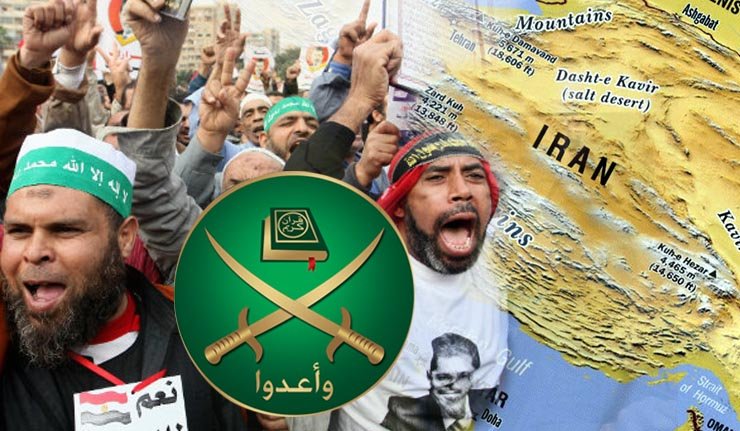Hossam al-Haddad
The Arab Organization for Human Rights in UK revealed recently a new aspect of the alliance between the International Organization of the Muslim Brotherhood, on one hand, and the mullahs ruling Iran, on the other.
This new aspect was demonstrated by the organization’s silence over the protests that have been raging on in Iran since late December.
Contrary to its muted response in this regard, the organization is always keen on backing the demonstrations that erupt in Arab states.
In a statement it released on January 14, 2018, the Arab Organization for Human Rights in UK listed the names of agencies affiliated to the International Organization of the Muslim Brotherhood, which did not express support to the protests taking place in Iran.
The organization even accused these agencies, including the International Union of Muslim Scholars, which is headed by Sheikh Youssef al-Qaradawi, of being mere protégés of the Iranian regime.
The agencies also included AlKarama Foundation, which is headquartered in Geneva and headed by Abdulrahman al-Nuaimi, who has been placed in an international list of wanted terrorists, and the International Center for Justice and Human Rights which is also headquartered in Geneva.
These agencies, the Arab Organization for Human Rights in UK, said had failed to defend the Iranian people who are being killed by the Iranian police and army. They did not even issue a statement of condemnation of human rights violations committed by the Iranian regime, the organization said.
It considered this silence a strong proof of collaboration between the Brotherhood and the mullahs ruling Iran.
Egypt’s Brotherhood and the Iranian leadership
The first plane landing in Tehran International Airport soon after Khomeini took over in Iran on February 11, 1979 was one carrying a delegation representing the International Organization of the Muslim Brotherhood.
According to some accounts, the members of the Brotherhood delegation suggested during their meeting with Khomeini to declare a caliph of all Muslims.
They also suggested issuing a statement in which they would say that differences between Sunnis and Shiites were a mere political, not religious, issue.
Khomeini promised, however, to consider the idea and reply to the members of the delegation later, according to the same accounts.
Nevertheless, the Iranian constitution that was drafted after the Islamic Revolution in Iran in 1979 replied to the suggestion by recognizing the guardianship of the Islamic jurist.
The Muslim Brotherhood in Egypt continued, however, to back the new Iranian regime. They staged major protests when the late Egyptian President, Anwar Sadat, decided to receive the Shah of Iran in Egypt and also backed Iran in its war against Iraq.
The Canadian magazine, Crescent, quoted then-supreme guide of the Muslim Brotherhood in 1984, Umar al-Tilmisani, as saying that he knew no member of the Muslim Brotherhood who criticized Iran.
Khomeini himself translated two of the books written by Sayed Qotb into Farsi in 1979, a short time before the eruption of the Islamic Revolution in Iran.
Ali Akbar Velayati, an international affairs advisor of the Islamic Revolution, said in an interview with the Iranian news agency, Mehr, that Egypt and Iran influenced each other and were influenced by each other.
He added that the Islamic revival in Iran had contributed to the emergence of renowned Egyptian religious figures and that the Muslim Brotherhood had influenced Islamist movements in Iran.
The leader of the Islamic Revolution Iran, he said, had translated a number of the books of Sayed Qtob to Farsi.
After the revolution, he added, Khomeini’s book, “Guardianship of the Islamic Jurist”, was also translated into Arabic, noting that the book had had great effects on Islamic revival in all Arab states, in general, and in Egypt, in particular.
Former supreme leader of the Muslim Brotherhood, Mohamed Mahdi Akef, expressed backing of Iran several times in 2005 as the Islamic Republic resumed its nuclear activities.
A week before the Hosni Mubarak regime fell down in Egypt in 2011, Ali Khamenei compared the protests raging on in Egypt then with the Iranian revolution of 1979.
When Mohamed Morsi of the Muslim Brotherhood won the presidential elections in Egypt in June 2012, Iran was one of the earliest countries to congratulate him on his election victory.








































admin in: How the Muslim Brotherhood betrayed Saudi Arabia?
Great article with insight ...
https://www.viagrapascherfr.com/achat-sildenafil-pfizer-tarif/ in: Cross-region cooperation between anti-terrorism agencies needed
Hello there, just became aware of your blog through Google, and found ...